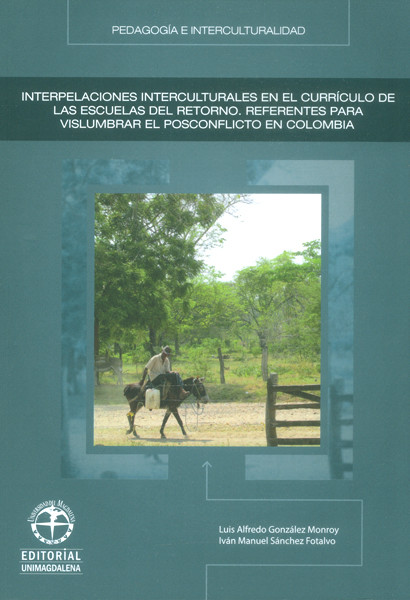
- Edición: 1
- Año de edición: {{getMes(9-1)}} de 2016
- No. de páginas: 78
- Formato: Impreso
- Idioma: Español
- ISBN Impreso: 9789587460773
Interpelaciones interculturales en el currículo de las escuelas del retorno
Referencias para vislumbrar el posconflicto en Colombia
View title and subtitle in English
Title in English: Intercultural interpellations in the curriculum of return schools
Subtitle in English: References to glimpse the post-conflict in Colombia
INTRODUCCIÓN 1. PROBLEMA DE ESTUDIO2. PERSPECTIVA TEÓRICA2.1 La escuela: lugar de reencuentro de las víctimas del desplazamiento forzado que han retomado a sus lugares de origen2.2 El currículo como noción sociocultural 2.3 El currículo como noción de un estado homogeneizante 2.4 Currículo del retomo: una propuesta desde la vulnerabilidad2.5 Interculturalidad en el currículo2.6 El currículo inclusivo en la escuela del retomo 2.7 Currículo del retomo: emancipación y decolonialidad3. PERSPECTIVA METODOLÓGICA3.1 Diseño de la investigación 3.2 Exegética intercultural del currículo de una escuela del postconflicto CONCLUSIONES REFERENCIAS BIBLIOGRÁFICAS ANEXOS
Description in English: This book presents the results of a socio-educational research study carried out in a community that suffered forced displacement due to the fratricidal conflict experienced in Colombia since the middle of the last century. Today, these people are returning to the lands from which they were dispossessed by armed actors. Likewise, the authors of the text announce themselves as members of the Educational Quality in a Plural World (CEMPLU) research group, attached to the University of Magdalena. This allows for the consideration of the academic community of the region, the nation, and the Latin American brotherhood, offering a new epistemological perspective to address the phenomena that occur within schools.But it is also a manifestation of courage in which hope is offered to all those people who for one reason or another have suffered violations of their personal and social rights, and to those who still refuse to give up, and who, in the midst of their pain, their voices are still spoken to uplift the world.This document has been prepared in a friendly, prudently natural emerging language, in which some epistemological constructs germinated in the development of an empirical study carried out in the "Los Tres Ángeles" rural school in the La Pola village, in the municipality of Chibolo, Magdalena (Colombia). Its writing is done from an inductive exercise, that is, it emerged from below, where the participants were not inhibited, as they raised their voices to calmly contribute to the theoretical analysis of the object of study faced.In this way, the proposal of a curriculum for people who have returned from an unplanned exile emanated; its beneficiaries were empowered by their inherited sociocultural heritage, in which local knowledge was anchored that gave them identity and made them different, but not less than their peers, those who welcomed them on their return. Then the curriculum becomes valid in the community, giving meaning to life and causing an explosion of new reasons to claim oneself as people and realize oneself as human beings.View description in English
INTRODUCCIÓN 1. PROBLEMA DE ESTUDIO2. PERSPECTIVA TEÓRICA2.1 La escuela: lugar de reencuentro de las víctimas del desplazamiento forzado que han retomado a sus lugares de origen2.2 El currículo como noción sociocultural 2.3 El currículo como noción de un estado homogeneizante 2.4 Currículo del retomo: una propuesta desde la vulnerabilidad2.5 Interculturalidad en el currículo2.6 El currículo inclusivo en la escuela del retomo 2.7 Currículo del retomo: emancipación y decolonialidad3. PERSPECTIVA METODOLÓGICA3.1 Diseño de la investigación 3.2 Exegética intercultural del currículo de una escuela del postconflicto CONCLUSIONES REFERENCIAS BIBLIOGRÁFICAS ANEXOS
- OCDE (Área, Subárea y Disciplina) Ciencias sociales > Ciencias de la educación > Educación general (incluye capacitación, pedagogía)
- Colección y serie: Ciencias Sociales > Educación y pedagogía
- Categoría: Libro producto de investigación
- THEMA: Educación; Conflicto armado
- BISAC: EDUCACIÓN > Investigación
- DEWEY: Sociología y Antropología > Educación > Educación > Educación, investigación, temas relacionados
- Edición: 1
- Año de edición: 2016
- ISBN impreso: 9789587460773
- DOI:
- No. de páginas: 78
- Medidas en cm (Alto, Ancho, Grosor): 24, 17, 0,5
- Idioma: Español

